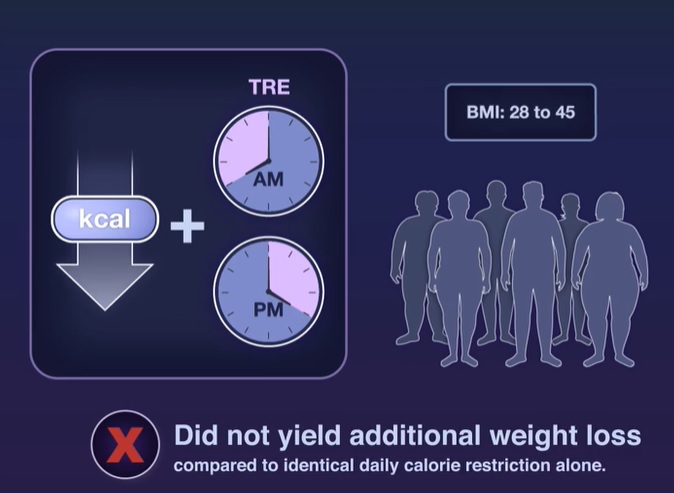Background
The long-term effectiveness and safety of time-restricted feeding for weight loss is unclear.
Methods
We randomly assigned 139 patients with obesity to time-restricted eating (eating only between 8:00 a.m. and 4:00 p.m.) with caloric restriction or daily caloric restriction only.
For 12 months , all participants were instructed to follow a calorie-restricted diet consisting of 1500 to 1800 kcal per day for men and 1200 to 1500 kcal per day for women.
The primary outcome was the difference between the two groups in change from baseline in body weight; Secondary outcomes included changes in waist circumference, body mass index (BMI), amount of body fat, and measures of metabolic risk factors.
Results
Of the total 139 participants who were randomized, 118 (84.9%) completed the 12-month follow-up visit. Mean weight loss from baseline to 12 months was -8.0 kg (95% confidence interval [CI], -9.6 to -6.4) in the time restriction and - 6.3 kg (95% CI, -7.8 to -4.7) in the daily calorie restriction group.
Weight changes were not significantly different in the two groups at the 12-month evaluation (net difference, -1.8 kg; 95% CI, -4.0 to 0.4; P = 0.11).
The results of the analyzes of waist circumferences, BMI, body fat, lean body mass, blood pressure, and metabolic risk factors were consistent with the results of the primary outcome.
Furthermore, there were no substantial differences between groups in the number of adverse events.

Conclusions Among patients with obesity, a time-restricted eating regimen was no more beneficial with respect to reducing body weight, body fat, or metabolic risk factors than daily calorie restriction. |
Funded by the National Key Research and Development Project [No. 2018YFA0800404] and others; ClinicalTrials.gov number, NCT03745612
















